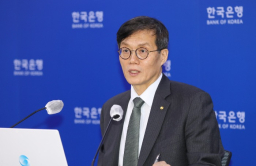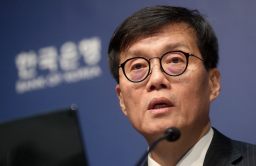-
KOSPI 2577.27 -2.21 -0.09%
-
KOSDAQ 722.52 -7.07 -0.97%
-
KOSPI200 341.49 +0.02 +0.01%
-
USD/KRW 1396 -2.00 0.14%
BOK lowers growth forecasts to bolster rate cut expectations
Central bank
BOK lowers growth forecasts to bolster rate cut expectations
BOK expects political crisis to cut 2025 economic growth by 0.2 percentage point amid slower private consumption
By
Jan 20, 2025 (Gmt+09:00)
3
Min read
News+
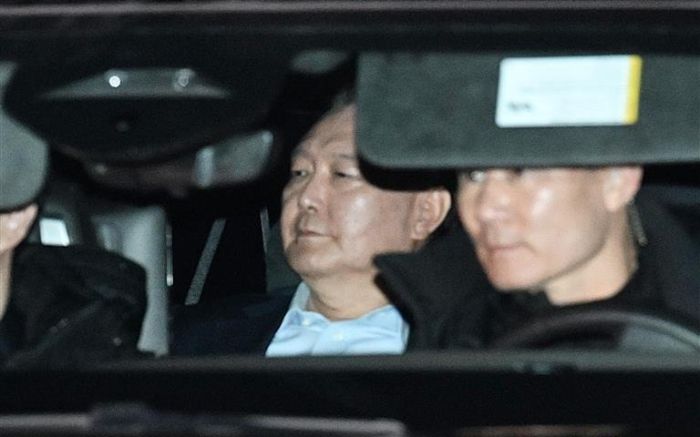
South Korea’s central bank slashed its economic growth forecasts on Monday, adding to views that the monetary authority will cut interest rates to revive Asia’s fourth-largest economy, dampened by political turmoil in the wake of a martial law declaration and US trade protectionism.
The Bank of Korea (BOK) said it expected the economy to grow 1.6-1.7% this year, lower than its previous forecast of 1.9% issued last November. Its latest prediction fell short of the government’s expectation of 1.8% released on Jan. 2.
The central bank also said the economy was estimated to have expanded 2.0-2.1% in 2024, missing its earlier forecast of 2.2%. Growth in the fourth quarter was seen up only 0.2% or less, failing to meet its earlier expectation of 0.5% due to President Yoon Suk Yeol’s martial law declaration.
“Sentiment among economic entities quickly deteriorated due to the overlapping political uncertainty after an unexpected martial law and the Jeju Air plane crash in December,” the BOK said in its official blog.
IN ADDITION TO TRUMP’S PROTECTIONISM, EXTERNAL HEADWINDS
This has occurred amid expected headwinds from external conditions such as intensifying global competition in core export industries and increased protectionism from US President-elect Donald Trump, the central bank added.
Trump, who takes office on Jan. 20, has threatened to impose sweeping tariffs and review generous subsidies for companies investing in the US, including those for the country’s allies and largest trading partners such as Korea.
The BOK announced its latest forecasts earlier than its regular February updates due to the ongoing political crisis. It usually releases economic forecast updates in February, May, August and November of each year.
Yoon became the country's first sitting president to be formally arrested on rebellion charges on Sunday as part of an investigation into his ill-fated declaration of martial law.
The political uncertainty and soured sentiment following that decree is expected to cut 2025 economic growth by 0.2 percentage point, the BOK said.
Private consumption lost momentum in the fourth quarter after recovering in the third, with growth in credit card use slowing sharply in late December, according to the central bank.
Sales of high-priced imported cars continued to shrink last month, while construction investment contracted further, the BOK added.
TO CUT INTEREST RATES
The gloomy forecasts reinforced expectations that the BOK will cut interest rates, economists said.
The central bank has been widely predicted to lower its policy rate in February after unexpectedly keeping it unchanged at 3.00% last week.
“We expect the Bank of Korea to resume interest rate cuts in February,” ING said in a note after the BOK’s decision on Jan. 16.
ING expected the BOK to lower the policy rate by 1 percentage point this year; the investment bank had downgraded its growth forecast for the Korean economy to 1.4% from 1.6% earlier.
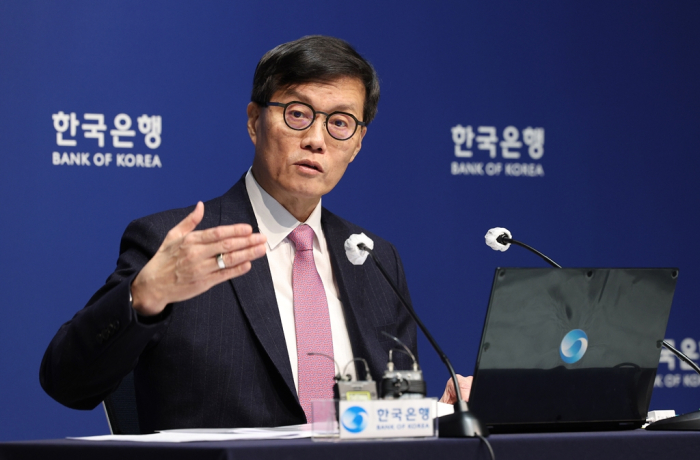
BOK Governor Rhee Chang-yong said policymakers agreed that more policy easing is needed over the next three months after the central bank left the rate unchanged on Jan. 16.
Rhee said the BOK kept the borrowing cost unchanged as the Korean won depreciated further due to the lingering political crisis.
“The political changes significantly affected the won,” Rhee said. “The current (dollar/won) exchange rate is much higher than that which reflects the country’s economic fundamentals and interest rate differentials with the US.”
The won has lost 3.8% against the dollar since the martial law declaration. The Korean currency weakened to 1,486.7 against the dollar on Dec. 27, the softest level since March 2009.
Write to Jin-gyu Kang at josep@hankyung.com
Jongwoo Cheon edited this article.
More To Read
-
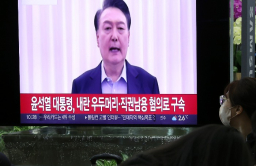 Business & PoliticsYoon becomes first S.Korean sitting president to be formally arrested
Business & PoliticsYoon becomes first S.Korean sitting president to be formally arrestedJan 19, 2025 (Gmt+09:00)
-
Jan 14, 2025 (Gmt+09:00)
-
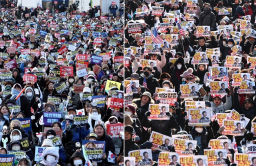 Business & PoliticsKorea sharply cuts 2025 growth forecast, opens door for extra budget
Business & PoliticsKorea sharply cuts 2025 growth forecast, opens door for extra budgetJan 02, 2025 (Gmt+09:00)
-
Dec 29, 2024 (Gmt+09:00)
-
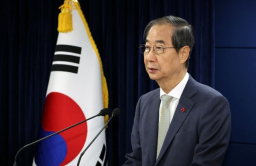 Business & PoliticsSouth Korea’s Acting President Han impeached; Stocks, won plummet
Business & PoliticsSouth Korea’s Acting President Han impeached; Stocks, won plummetDec 27, 2024 (Gmt+09:00)
-
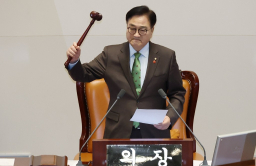 Business & PoliticsKorea’s president impeached over martial law; political turmoil to ease
Business & PoliticsKorea’s president impeached over martial law; political turmoil to easeDec 14, 2024 (Gmt+09:00)
-
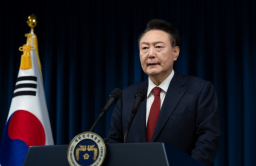 Business & PoliticsSouth Korea’s president apologizes for martial law
Business & PoliticsSouth Korea’s president apologizes for martial lawDec 07, 2024 (Gmt+09:00)
-
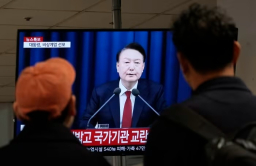 Business & PoliticsSouth Korea president to lift martial law after Parliament rejects move
Business & PoliticsSouth Korea president to lift martial law after Parliament rejects moveDec 04, 2024 (Gmt+09:00)
-
Nov 28, 2024 (Gmt+09:00)


